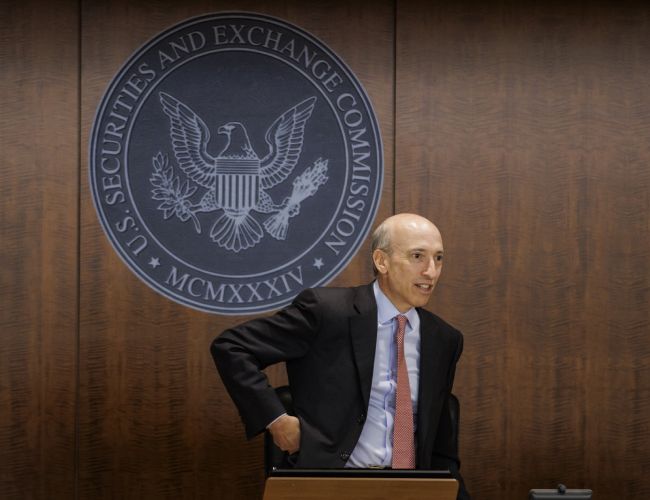With an emphasis on the Howey Test, oral arguments in the Kraken v. SEC case on claims of acting as an unregistered exchange and broker-dealer get underway.
The Ripple lawsuit serves as an example of how the Kraken case might move forward with a discovery phase. The SEC claims that 11 tokens, including $SOL, $ADA, and $ALGO, are securities and charges Kraken of operating as an unregistered exchange and broker-dealer.
Judge Orrick indicated a move in favor of the SEC throughout the ruling by asking the Kraken lawyer to try to change his mind before there was any debate. The community responded to this statement by recommending that the judge reject the move to dismiss and instead follow the decisions made by Judges Rakoff and Failla in the Coinbase case. MetaLawMan claims that Orrick didn’t hear anything that would make him reconsider.
Judge Orrick was beginning to move toward the notion of a digital asset “ecosystem,” but the Kraken lawyer questioned the SEC’s approach. Consequently, the lawyer described this view as “novel & not workable” and stated that it is “not grounded in law.” Kraken’s team also requested that Orrick reevaluate and attempt to follow Judge Torres’s position in the Ripple Case with respect to how secondary market sales of digital assets are handled.
The legal team also questioned Judge Failla’s comprehension of the Howey test’s definition of an investment and post-sale duties. Though there is no contractual relationship or post-sale duties, the SEC made a point of the “ecosystem,” also known as the “network,” noting that consumers who buy digital assets are investing in something and expecting a profit.
The @SECGov stuck to its “ecosystem” (they also used the word “network”) argument to illustrate that buyers of digital assets are “buying into something” with the hopes of getting some kind of return even if there’s no explicit contract or post-sale obligation. The lawyer… https://t.co/bQWZpfiBKr
— Eleanor Terrett (@EleanorTerrett) June 20, 2024
This method suggests that while deciding what, in accordance with the Howey Test, qualifies as an investment contract, the court should take the whole picture into account, taking into account advertising materials, issuer statements, and even the content available on Kraken’s website. This implies that years of research will probably be required to solve the Kraken situation.
Examples from the Kraken Case
Kraken has been charged by the SEC with operating an unlicensed securities exchange, acting as an unregistered broker-dealer, and acting as an unregistered securities clearing agency. Eleven tokens — $ADA, $ALGO, ATOM, FIL, FLOW, ICP, MANA, MATIC, NEAR, OMG, and $SOL — that are listed on Kraken have been declared securities by the SEC. The Howey Test, which states that the SEC has not claimed that any securities transactions took place on its exchange, is the basis for Kraken’s dismissal petition.
In response to the SEC action, Kraken filed a rebuttal, claiming the litigation ought to be dismissed since the agency’s case is insufficient. Kraken vehemently disputes the SEC’s accusations of dealing unregistered securities in its most recent statement.
As a result, the exchange claimed that the SEC had misidentified the investment contracts that are tradeable on the exchange and objected to certain terms the agency had used, such as “ecosystem” and “investment concept,” stating that they should have said “enterprise” and “investment contract,” respectively.
🚨NEW: Oral arguments for @krakenfx’s Motion to Dismisst against the @SECGov begins today at 1PM ET/10AM PT.
— Eleanor Terrett (@EleanorTerrett) June 20, 2024
In addition to Kraken operating as an unregistered exchange and broker-dealer, the SEC is claiming 11 tokens including $SOL, $ADA and $ALGO are securities.
As… https://t.co/YE4PBj9wxU
Senator Cynthia Lummis, the Blockchain Association, the DeFi Education Fund, the Chamber of Digital Commerce, the Investor Choice Advocates Network, Paradigm, and two administrative law academics have also endorsed Kraken’s move to dismiss. These organizations have submitted briefs defending Kraken’s claims.
Comparing the Coinbase and Binance Case
The legal community is awaiting news on whether the SEC will use the same defenses used in Coinbase’s move to dismiss the hearing in Kraken’s case. In that instance, the SEC asserted that token ecosystems qualify them as securities under the Howey Test. The SEC will investigate this claim to see if it still holds true in the present circumstances.
Furthermore, Kraken bases its case on SEC cases pertaining to initial coin offers (ICOs). The cryptocurrency exchange observes that these decisions dealt with rights and obligations under contracts, which aligns with Kraken’s perspective on investment contracts.
Paul Grewal, the chief legal officer of Coinbase, has previously charged that the SEC presents incoherent claims. Using the Howey Test, the SEC asserted once more in a related complaint against Coinbase that the majority of the supported coins are investment contracts. According to Coinbase, there is legal uncertainty in the digital asset market as a result of the SEC’s conflicting messages and uneven enforcement tactics.
Binance was also not left out by the SEC in its enforcemnt actions. Back in June, the SEC once again opened a lawsuit on Binance over the sale of unregistered securities. The creator of the cryptocurrency business Binance, Changpeng Zhao, is in the midst of settling the legal dispute with the SEC while serving his sentencing, which has been pushed back to April 30, 2024. Indeed, he has been questioned in-depth by the US crypto regulator. Reducing research and simplifying the current crypto situation are the objectives.
 cryptonews.net
cryptonews.net
